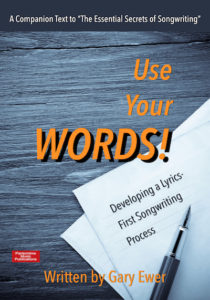Monday’s blog post, “Uniqueness is a Powerful and Necessary Element in Good Songwriting”, got me thinking a lot more about the challenges of writing something singular within a particular genre, and so think of this post as a kind of “Part 2” to that article:
One thing that practically all artistic works have in common, whether we’re talking about songwriting, sculpture, painting, literature, or anything else, is this: they usually get presented to an audience as a final step.
 Get this eBook FREE when you purchase “The Essential Secrets of Songwriting”10-eBook Bundle package. Eleven songwriting manuals for $37 USD!
Get this eBook FREE when you purchase “The Essential Secrets of Songwriting”10-eBook Bundle package. Eleven songwriting manuals for $37 USD!
If a work of art doesn’t get presented to an audience (let’s say you build a lovely bookcase for your living room), then I would say that you’ve done something that has artistic value, and that’s slightly different from saying that it is a work of art.
As you might imagine, the line between something that is art and something that has artistic value is a very fuzzy one, and can make for interesting debates. Is the Eiffel Tower a work of art, or does it more come under the heading of something that has artistic value? It gets presented, of course, but it’s mainly functional; it has a purpose that goes far beyond art.
Most artists would say that, among several other things, a work of art needs to start with a unique vision. Something about that work of art needs to be rare and uncommon. If that were not the case, it would simply be a copy of something else.
The Herb Called ‘Uniqueness’
But uniqueness is like a herb or spice that gets added to a meal. Too much uniqueness may simply fail to make a connection to an audience, being too singular, too odd. Oregano may be the ingredient that makes your sauce taste wonderful, but that herb will probably account for far less than one percent of the sauce.
In songwriting, uniqueness can’t mean that everything is unique. But the very fact that we can place most songs in one genre or another means that they are following certain conventions, certain expectations for that genre.
If you’re writing a country song, for example, there will be a need to present your musical ideas in such a way that the country genre shines through. That means that no matter how unique your ideas are, people need to hear a country style in the vocal lines, in the chord choices, the melodic ideas, the instrumentation, and so on.
Genres demand conformity. And conformity doesn’t sit well with many songwriters. Conformity means not only that something has been done in a certain way before, but usually that it’s been done a lot.
How Much Conformity is Too Much?
It’s all a matter of degrees. If your songs sound like every other song in your target genre, you may have written something that sounds nice, but possesses nothing that allows it to stand out: it fails to make a unique statement.
One of the best ways to make that unique statement is to work on your lyrics. It’s hard to be unique with chord choices, because chords need to be somewhat predictable in order to work well, and your chosen genre usually defines the kinds of chords you’ll use.
The same goes for melodic shapes and ideas. But lyrics? It is very possible to be unique and very creative with lyrics. Probably because of my age, I keep going back to Paul Simon’s songs as a great example of lyrics that are creative without being weird, imaginative without being confusing. His song “America” is quite possibly my favourite; it’s the perfect song, if there is such a thing.
I mentioned in Monday’s blog post that the key question you need to ask yourself is: “What is it about this song that sets it apart from all other songs out there?”
And if it’s hard to answer that question, don’t despair. Simply dive back into your song. It usually doesn’t take much: something instrumental, an unexpected chord, an interesting leap in the melody… all of these things are very insignificant on their own, but can make all the difference in how an audience hears your music.
 Written by Gary Ewer. Follow Gary on Twitter
Written by Gary Ewer. Follow Gary on Twitter
 Practice makes perfect, but only if you aren’t reinforcing mistakes. Get going in the right direction – Get “The Essential Secrets of Songwriting” 10-eBook Deluxe Bundle, and this special deal.
Practice makes perfect, but only if you aren’t reinforcing mistakes. Get going in the right direction – Get “The Essential Secrets of Songwriting” 10-eBook Deluxe Bundle, and this special deal.










